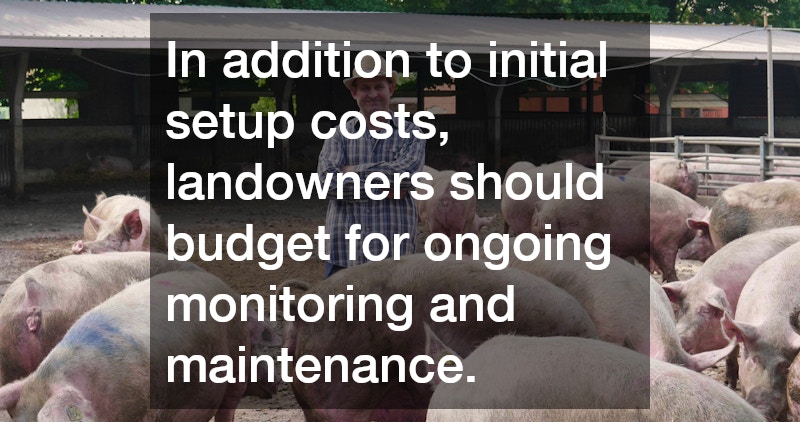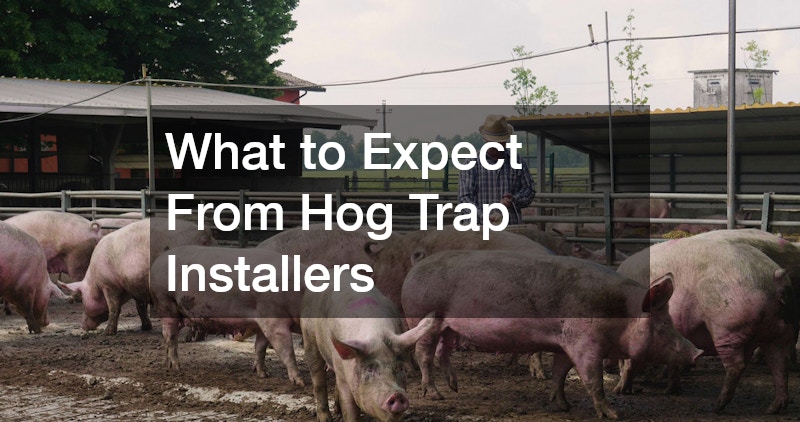
Invasive wild hog populations pose significant challenges to landowners and agriculture, necessitating effective management strategies. Hog trap installers play a crucial role in controlling these populations. This article outlines what you can expect when engaging the services of hog trap installers.
What Services Do Hog Trap Installers Provide?
Trap Setup and Design
Hog trap installers provide various trap setups tailored to the specific setting and the behavior of the local hog population. The most common types of traps include corral, snares, and box traps, each offering unique advantages depending on the situation.
Professional installers focus on ensuring the trap’s design is robust and escape-proof, as wild hogs are known for their strength and determination. Additionally, they carefully position the traps where hog activity is most prevalent, which maximizes capture success rates.
The design process often involves using advanced technologies such as remote monitoring and automatic trigger systems. These technologies enable quick adaptations to trap designs based on the monitoring data collected.
Monitoring and Maintenance
After the installation of hog traps, regular monitoring is crucial to maintain their effectiveness. Installers use game cameras and other remote sensing devices to observe hog movements and the conditions of the traps.
Maintenance services assure that traps remain functional and humane, with routine checks and repairs as necessary. This ongoing support from professional installers can make the difference between a successful long-term hog control strategy and continuous losses to crops and property.
Furthermore, these services often include adjustments based on seasonal changes and environmental conditions. This adaptability enhances the success of the hog traps and provides landowners with peace of mind.
How to Choose the Right Hog Trap Installer?
Experience and Expertise
When selecting a hog trap installer, consider their experience and experience in the field. Installers with a proven track record often have refined techniques that increase trapping efficiency.
Look for professionals with specialized knowledge in wildlife management and can offer insights into regional hog behavior. Their expertise is invaluable in crafting effective and sustainable strategies.
Experienced installers are also more likely to understand the ecological implications of hog trapping comprehensively. They can advise on practices that protect the broader environment while addressing the immediate concerns of hog invasion.
Client Reviews and Testimonials
Evaluating client reviews and testimonials is essential when choosing a hog trap installer. Positive feedback from past clients strongly indicates reliability and customer satisfaction.
Testimonials provide insight into the effectiveness and professionalism of the services offered. They can highlight key service areas, such as timeliness, communication, and overall success rates, helping prospective clients make informed decisions.
Additionally, reputable installers should willingly provide references or case studies upon request. This transparency builds trust and assures potential clients of the installer’s capabilities and credibility.
What Are the Costs Involved?
Initial Installation Costs
The cost of initial trap installation varies based on several factors, including the complexity of the trap and the geographical location. A well-designed trap system is an investment that balances upfront expense with long-term savings by effectively reducing hog-related damages.
Some installers offer package deals that may include multiple traps and monitoring equipment at a discounted rate. Landowners should discuss their specific needs with installers to get a clear understanding of the potential costs involved.
Remember that while upfront costs can be significant, choosing a high-quality installation can save money over time. Effective trapping reduces the need for more drastic and potentially expensive measures later.
Ongoing Maintenance Expenses
In addition to initial setup costs, landowners should budget for ongoing monitoring and maintenance. Regular trap upkeep ensures their continued effectiveness and compliance with wildlife regulations.
These recurring expenses can vary widely, depending on the frequency and extent of the required services. Professional installers typically offer maintenance plans tailored to the client’s trapping intensity and property size.
Investing in proactive maintenance can prevent more costly repairs in the future and ensure that the traps remain legally compliant and safely operational. Regular maintenance is an integral part of a successful long-term hog management strategy.
What Are the Advantages of Professional Hog Trapping?
Effective Population Control
Professional hog trapping is a highly effective method of controlling invasive hog populations, safeguarding valuable land and crops from destruction. Skilled installers utilize techniques that significantly reduce hog numbers, creating a more balanced ecosystem.
This approach targets large groups of hogs at once, resulting in immediate population decreases. Landowners can consistently manage hog numbers to prevent the extensive damage that unchecked hog populations can cause.
Furthermore, professional trapping is adaptable to different herd behaviors and environmental changes, significantly increasing its success rate compared to amateur efforts. This adaptability is crucial for sustainable wildlife management.
Safety and Compliance
Engaging with professional hog trap installers ensures that all trapping activities adhere to local wildlife regulations and safety standards. This compliance is essential to avoid legal issues and assure ethical treatment of animals.
Professionals are trained to implement safety measures that protect humans and non-target species from harm, reduce liability, and promote humane practices. They also keep informed of any changes in legislation that could impact trapping activities.
Additionally, professional installers are adept at managing risks associated with wild hog trapping, such as the potential for hogs to transmit diseases to livestock or humans. Their experience minimizes these risks, making wild hog management safer for all parties involved.
Engaging with professional hog trap installers offers multiple benefits, including experience, efficiency, and compliance with local laws. Understanding the services, costs, and advantages outlined in this article can guide landowners in making informed decisionsabout effectivelyr managing hog populationy.

